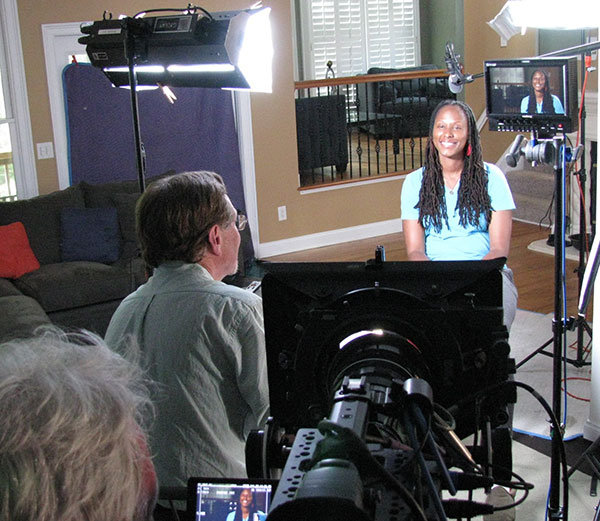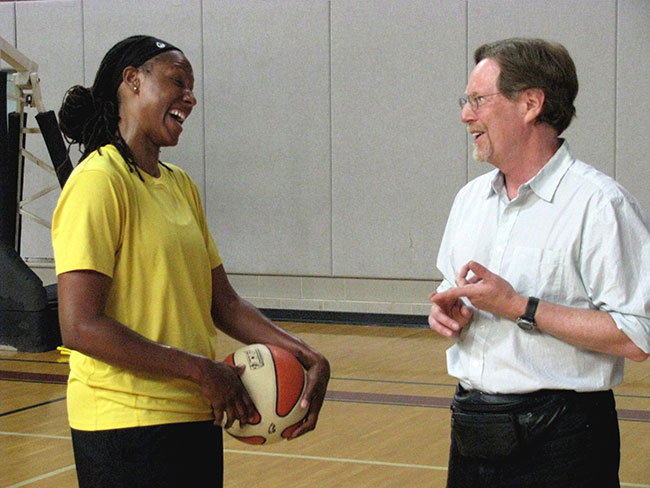Rick Goldsmith, an independent filmmaker from Berkeley, Calif., is a 2013-2014 Rosalynn Carter Fellow for Mental Health Journalism.
For more information on the film Mind/Game: The Unquiet Journey of Chamique Holdsclaw, and on director Rick Goldsmith, please go to mindgamefilm.org.
I was drawn to WNBA star Chamique Holdsclaw’s story from the day I read a piece on her in the New York Times in early 2012. She’d been the best of the best at her sport, took a great fall, but emerged in apparent recovery as an advocate who was remarkably candid about her own story.
Holdsclaw’s story was not just about demons, but about life’s challenges, how we approach them, and, ultimately, the human spirit. What drives an athlete to be the best? Arguably, others had Holdsclaw’s talent, but only she won championships seven years in a row. How did she get the most of her talent? Why was it she who got derailed by depression? What of her drive for perfection and for winning? Were there attributes that both contributed to her success and led to her downfall? And will the characteristics that made her a champion lead ultimately to her success in recovery?
I thought I had in front of me a compelling, but essentially neat and tidy, story: It had a clear beginning (from challenging beginnings comes a champion), middle (depression and near-suicide derails her) and end (recovery and advocacy cast light on a social problem). But life intervened and changed our script. Chamique had a serious lapse and setback in an incident that made headlines. She now faced serious legal hurdles, a damaged reputation, and a new diagnosis: bipolar disorder.
This event might have derailed her life and, with it, the film. But Holdsclaw insisted she was in for the full ride, and committed to continuing to reveal her ongoing challenges on camera. That was encouraging, but I sensed that the larger stakes were going to necessitate even more rigorous efforts to figure out how to tackle the mental health/illness issues sensitively and meaningfully.
I had personal reasons to tell this story. I’ve lived with mental illness in my own family. My uncle endured 60 years of schizophrenia that began when he was in the Navy during World War II. He was a gentle soul, a creative artist and musician, but interacted little with others and lived a life of inner turmoil. Aside from medication, he got very little help. I always wondered, why?
I sought out those who deal, in their working life, with these issues every day, such as advocates and mental health experts. During this pursuit, I noted that the Rosalynn Carter Mental Health Journalism Fellowships were established “to develop a cadre of journalists who can have a significant impact on the public’s understanding of mental illnesses” as part of a larger program “to provide the public with accurate and balanced depictions of those with mental illnesses to reduce stigma and discrimination.” I felt this opportunity was right up my alley, and I decided to apply.
Being selected for the Carter Fellowship at a critical junction in the film’s production couldn’t have come at a better time. The opportunity to consult and work with leading mental health and journalism experts will undoubtedly sharpen the focus and enrich the depth, impact, and reach of the final film.
In a recent conversation with Chamique, she and I agreed that her deepening journey could be more powerful, more revelatory, more instructive, and more REAL, for what it says about mental illness and the way we as friends, family, and society, deal with the associated challenges, than either of us had first envisioned.

Independent filmmaker Rick Goldsmith interviews WNBA star Chamique Holdsclaw for the documentary, “Mind/Game: The Unquiet Journey of Chamique Holdsclaw.” The film is Goldsmith’s fellowship project as a member of the 2013-2014 class of Rosalynn Carter Mental Health Journalism Fellows. (All photos: R. Goldsmith)

“Being selected for the Carter Fellowship at a critical junction in the film’s production couldn’t have come at a better time. The opportunity to consult and work with leading mental health and journalism experts will undoubtedly sharpen the focus and enrich the depth, impact and reach of the final film,” says Goldsmith.
For more information about the 2013-2014 class of Rosalynn Carter fellows >
Please sign up below for important news about the work of The Carter Center and special event invitations.